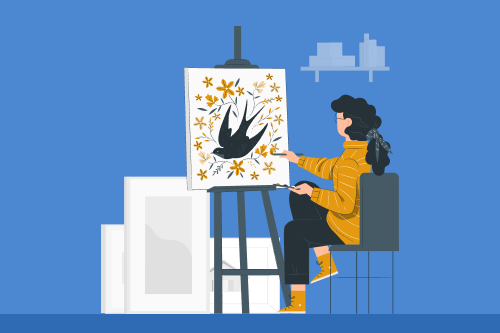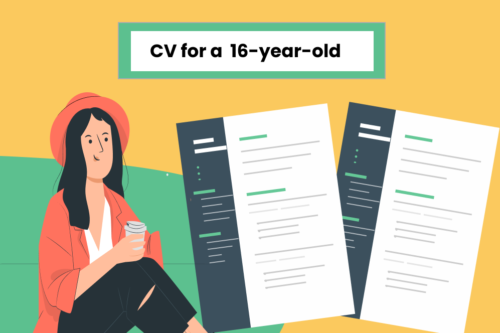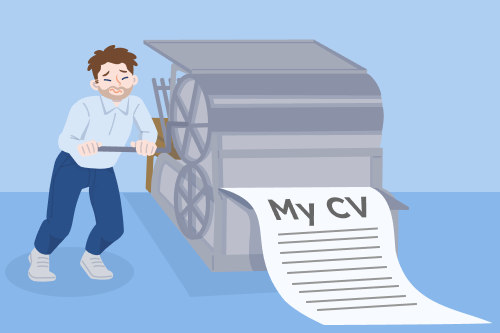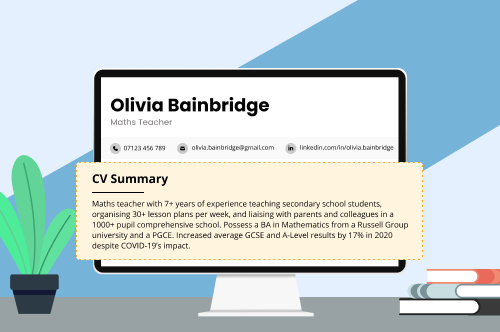Curious about what different hobbies and interests say about you? In this video, Career Expert Seb breaks down the types of leisure activities you should put on a CV:
Hobbies and interests is an optional section that appears last on a properly structured CV.
Its purpose is to give employers an understanding of who you are beyond your work experience, skills, and education.
If it’s well written, your hobbies and interests section can be the deciding factor in helping you land a job interview. If it’s poorly written, it’s dead space.
Take a look at this hobbies and interests example from a graphic designer CV.
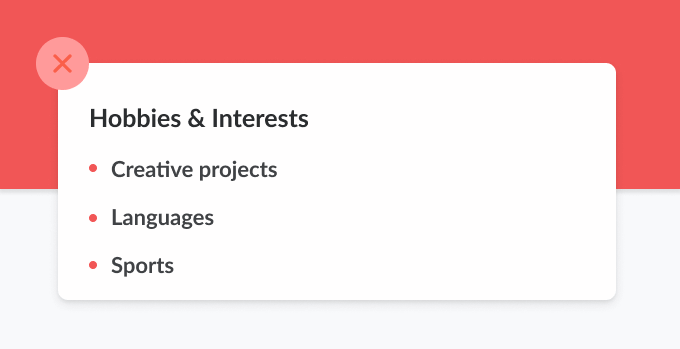
Creative projects, languages, and sports can be interesting. But listed out like this, they don’t tell us much about the applicant.
Meanwhile, this hobbies and interests section gives us a vivid picture of the person behind the CV:
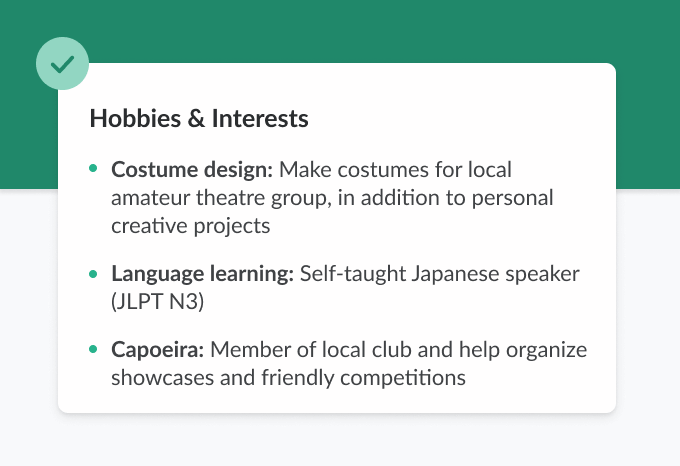
Employers look at your hobbies and interests section to get a better idea of who you are and whether you’ll be a good fit for the company culture.
As a result, your hobbies and interests might sometimes even determine the success of your application, especially if you’re applying for a competitive role or are similarly qualified to another applicant.
In this article, we’ll show you how to write a hobbies and interest section that gets the employer’s attention and gives your CV a more competitive edge.
What are the best hobbies and interests to put on your CV?
The best (and only) hobbies and interests to put on your CV should be relevant to your target job and highlight your key skills.
Which hobbies and interests you choose for your CV tells the employee much more than what you like to do in your free time. Often, they indicate important soft skills (personality-related traits) that you could bring to the company.
Here are some ways you can showcase your soft skills through your list of hobbies and interests:
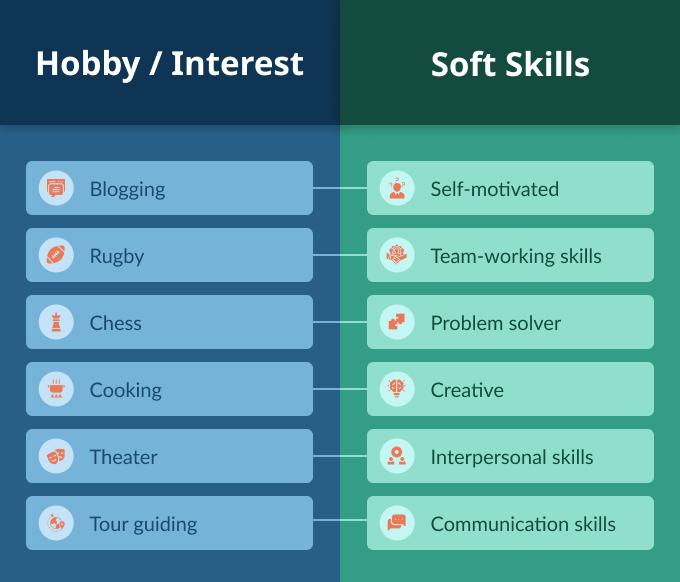
Examples of hobbies and interests for any CV
Here are some more hobbies and interests that impress employers in any industry:
- Gardening: Responsibility, patience
- Playing music: Spatial intelligence, memory
- Crossword puzzles/word games: Problem solving, verbal skills
- Sudoku/number games: Analytics, data management
- Blogging: Written communication, initiative
- Cooking/baking: Ability to follow instructions
- Hiking/biking: Physical fitness
- Art: Creativity, innovation
Attractive hobbies and interests by industry
The best hobbies and interests for your CV will differ depending on the kind of work you want to do.
Here are the best hobbies and interests to show employers in seven specific industries.
Business & finance
- Strategy/puzzle video games
- Fantasy sports leagues
- Geocaching
- Golfing
- British Chambers of Commerce
- Institute of Directors
These hobbies and interests work because they highlight your analytical, networking, and presentation skills, which are highly valuable in the business and finance fields.
Technology
- Robotics and AI
- Attending tech exhibitions
- Keeping up with tech news
- Flexbox Defense
- Website design
- 3D printing
Listing the above hobbies and interests on your CV shows the employer that your interest in tech extends beyond your day job.
Sales & marketing
- Creating memes
- Social media
- Standup comedy
- Etsy
- Participating in arts and craft fairs
- SEO
These hobbies and interests indicate that you’re the creative, industrious, and personable employee that sales and marketing employers need to promote their products.
Education
- Arts and crafts
- Reading
- Toastmasters
- Travelling
- Learning about various cultures
- Child psychology
Listing these hobbies and interests shows employers that you have the public speaking skills and thirst for knowledge that make you a great teacher.
Health care
- Exercise
- Volunteering
- Caring for children
- Reading medical journals
- Raising pets
- Foreign languages
Health care jobs require physical fitness, up-to-date medical knowledge, and the ability to clearly and empathetically communicate with patients. The above hobbies and interests show such necessary skills.
Art & design
- Playing a musical instrument
- Creative UK membership
- Visiting art museums/galleries
- Art history
- Architecture
- Animation
The above skills indicate that you have a natural interest in art and design that will make you a successful creative.
Entertainment & broadcasting
- YouTube video creation
- Podcasting
- Improv
- Community theatre
- Dancing
- Performing magic tricks
If you’re applying for a job in the entertainment or broadcasting industries, list the above hobbies and interests to show your versatility.
Examples of hobbies and interests for specific skills
Employers list the skills they’re seeking in their job postings. To get an interview, you must show that you have those skills on your CV — including in your hobbies and interests section.
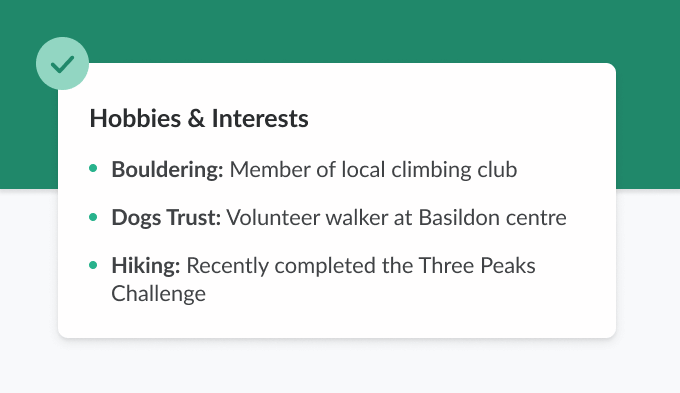
Here are good examples of hobbies and interests to list if your target employer is seeking:
Interpersonal skills
- Organising parties/events with friends
- Keeping up with current affairs
- Participating in industry conferences/exhibitions
- Playing in sports leagues
- Volunteering at a nursing home
- Tour-guiding
Technical skills
- CSS Diner
- Computer building/repairing
- Recording and mastering music
- Working on vehicles
- Brewing beer
- Game development
Creative skills
- Oil painting
- Photography
- Composing music
- Makeup art
- Interior design
- Flower arranging
Management skills
- Coaching an ECB Junior Cricket team
- Organising volunteer activities
- Leading World of Warcraft campaigns
- British Youth Council
- Student council membership
- Babysitting
Do you need to put hobbies and interests on your CV?
You should almost always include your relevant hobbies and interests in the information you put on your CV. Here’s why:
- Your skills and hobbies give employers an idea of what kind of person you are and how well you’ll fit into their company culture
- If you lack the professional experience necessary for your target job, listing your non-work activities that show you do have the required skills could help you get the job anyway
The only time you shouldn’t list your hobbies and interests when writing a CV is when your other relevant details already fill the standard two-page CV (or your one-page CV if you’re applying without much relevant experience).
If your CV is too long to include hobbies and interests, you can still let the employer know what you do in your spare time when you create your cover letter.
If you’re a student, listing job-related hobbies and interests on your CV can help you compete with more experienced candidates. So look at well-written CV examples with hobbies and interests sections to see how to optimise this section.
How to write your CV hobbies and interests section
Here’s how to write a great CV hobbies and interests section.
1. Take a closer look at the job and company
First, research the company by checking its About Us page as well as press releases and company news. You should also consider what skills the employer is looking for.
Develop a profile of the company. Ask yourself the following questions:
- If this job/company was a person, how would I describe them? (e.g. Creative, detail-oriented)
- What kind of soft skills (personality traits) does this company value?
- What traits might someone senior at this company need?
Developing a profile of the company will help you understand what kind of traits and skills will be a good fit for the company culture. You can then use these traits and skills as a guide for deciding which hobbies and interests to put on your CV.
2. List your hobbies and interests
Describe each hobby and interest in a sentence or two, including any relevant data and achievements.
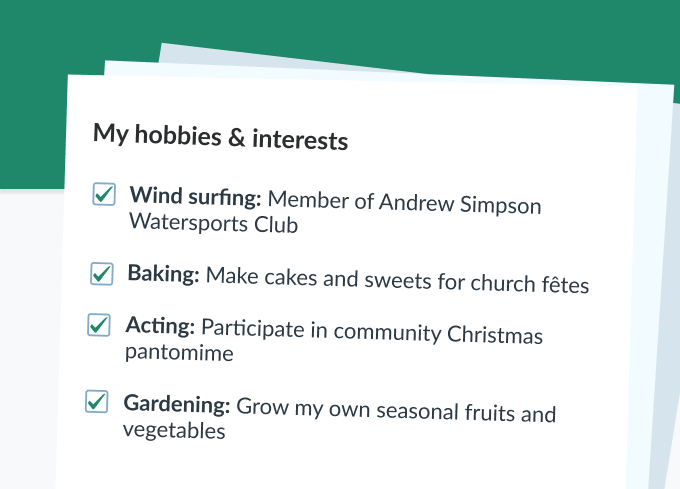
3. Choose two to four suitable hobbies and interests to highlight
Compare your list of hobbies and interests with the company’s profile and choose two to four listed items that suit the culture of your potential employers.
Picking the right hobbies and interests for your CV takes time. But you can speed up the application process by using a CV maker to build the rest of your CV in minutes.
4. Put your hobbies and interests on your CV
When you lay out your CV, your hobbies and interests section should look like this:
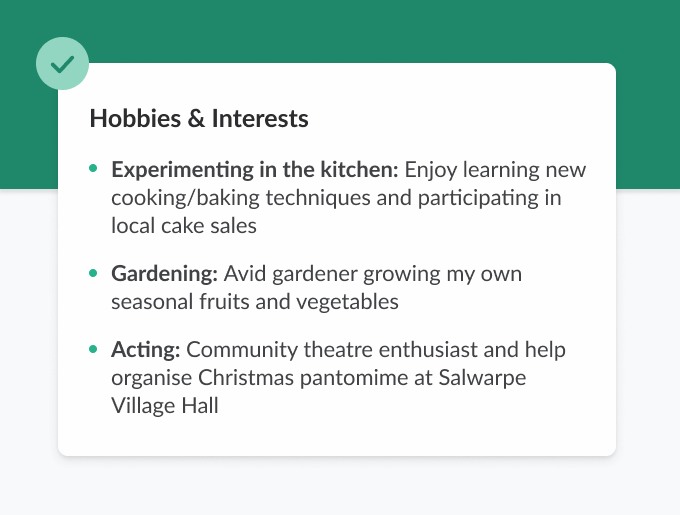
Making a video CV? Include short clips and images of your hobbies and interests to give employers a literal image of the type of person you are.
Hobbies and interests to leave off your CV
Some hobbies and interests are best kept off your CV to avoid offending an employer. Unless you’re applying for a job that specifically requires them, don’t list interests and activities that are related to the following controversial areas:
- Politics
- Religion
- Hunting
- Weapons and firearms
